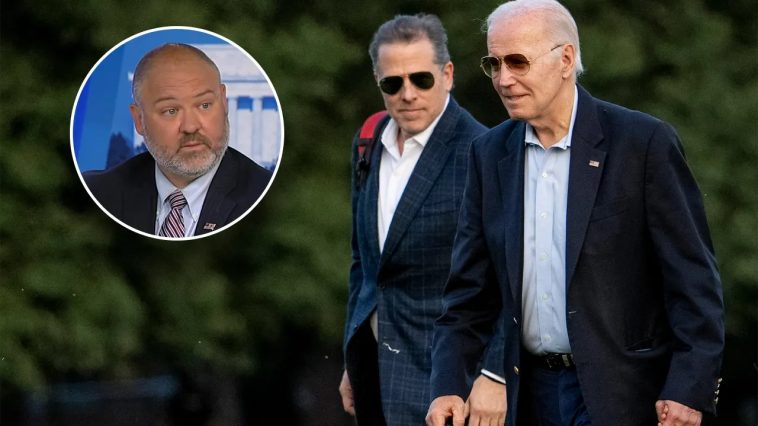LISTEN HERE:
Gary Shapley, a whistleblower from the Internal Revenue Service (IRS), affirmed on Wednesday that U.S. Attorney for D.C., Matthew Graves, declined to levy charges against Hunter Biden for potential tax evasion.
Notably, Graves is a known former campaign contributor to President Biden’s 2020 presidential run. Shapley’s confirmation during the tumultuous House Oversight Committee hearing suggested a possible political influence within the Department of Justice affecting an investigation targetting Hunter Biden.
Shapley underscored his point by adding that ‘The Justice Department condoned the interference of the president’s political appointees in determining the prospect of levying charges against the president’s own son’.
This comes after U.S. Attorney for D.C., Matthew Graves, also a Biden appointee, decided not to proceed with charges in March 2022.
Shapley further revealed that David Weiss, U.S. Attorney, clearly stated in a meeting with FBI and IRS senior leadership on October 7, 2022, that he was not the deciding voice on whether charges were filed or not. This statement challenged the common perception of Weiss’ authoritative role in such decisions.
In a revelation that initially was exposed by the Daily Caller, Federal Election Commission records show that while serving at law firm DLA Piper before his nomination and confirmation as U.S. Attorney in 2021, Matthew Graves had donated to Biden’s 2020 campaign.
The donations, amounting to a total of $1,500, were seen in records of April and May during the intense phase of the Democratic presidential primaries in 2020.
The Department of Justice addressed these allegations in June by stating that U.S. Attorney David Weiss was, indeed, the primary authority on the matter.
The DOJ communicated to Fox News that Weiss had the prerogative to decide on the timing, place, and nature of charges as per his assessment.
Also, no further approval for his actions was required. The DOJ noted that any inquiries related to his investigation should be addressed to the U.S. Attorney’s Office for Delaware.
The House committee’s investigation focused on claims made by Shapley and fellow whistleblower Joseph Ziegler. The pair suggested a pattern of ‘slow-walking investigative steps’ towards Hunter Biden, including explicit orders to refrain from interviewing him at his residence.
These ‘slow-walking’ claim further suggested that there was an attempt to indirectly inform the president’s son and his staff about the ongoing investigation, thereby possibly influencing their responses.
This was seen as a measure to delay enforcement actions in the crucial months leading up to the 2020 presidential election, another point of contention that has since been raised.
Both Shapley and Ziegler were appointed to the federal examination probing into Hunter Biden’s potential tax and firearm offenses. Amid these controversies, Biden, however, pleaded guilty to the lesser charge of misdemeanor tax offenses under an agreement with federal prosecutors.
This agreement, perceived as lenient considering the allegations, incited criticism from numerous Republican leaders, who saw it as a partial response. Such backlash has contributed to persistent concerns about possible political influence within judicial decision-making processes.
The parliamentary hearing against this backdrop indicates a continued effort by House Republicans to look into the activities of the president and his family. This dedication comes in light of the DOJ’s inability to identify concrete evidence of illicit behavior.
The implications of Shapley’s and Ziegler’s whistleblower claims, if true, could point towards intriguing dynamics between the DOJ and political appointees. The fact that these claims center around the president’s son, Hunter Biden, makes the scenario even more intriguing from a political perspective.
Many in the conservative camp view these allegations and findings as a reflection of a broader issue, namely political bias in judiciary decisions. This perception has been reinforced by several instances, such as the seeming reluctance in proceeding with charges against Hunter Biden.
The slight to no consequences faced by Hunter Biden, despite claims of potential tax evasion, draw a stark contrast when compared to the general tax law enforcement trends. Many perceive this disparity as a consequence of political bias and interference – a troubling prospect.
For our conservative readers, the narratives emerging from such incidents seem to strongly underscore the necessity for an independent and unbiased judiciary. Such a system allows for the fair and objective enforcement of the law, regardless of an individual’s political or family ties.
Looking forward, it remains to be seen whether the controversy surrounding these events will result in any substantial shifts in how investigations are conducted or how checks and balances are maintained. It is a situation that continues to evolve, underscoring the need for ongoing vigilance and transparency in these matters.



